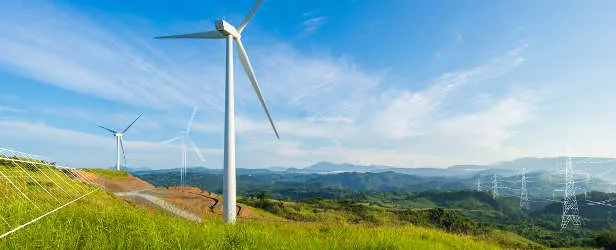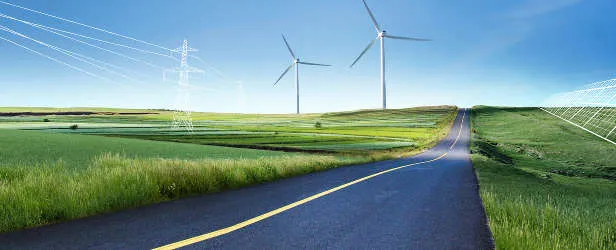July 25, 2019 | Podcast
The road to resilience
| Transcript: |
|---|
Transcript:NARRATOR 1
Welcome to the DNV GL Talks Energy podcast series. Electrification, rise of renewables and new technologies - supported by more data and IT systems, are transforming the power system. Join us each week as we discuss these changes with guests from around the industry.
|
Transcript:NARRATOR 2
Hello, you’re listening to ‘Face the Facts’, the new current affairs podcast from DNV GL Talks Energy, where the world’s leading energy experts share their insights on the most important global news stories about the energy transition.
Natural disasters hit the headlines recently, as Storm Barry made its way across the Gulf of Mexico towards the coast of America, bringing with it fears of damage, disruption and loss of life. The extreme weather we are now seeing around the world each week – from floods to hurricanes – makes us consider the impact of global warming more and more. In this episode Michael Liebreich, Chairman and CEO of Liebreich Associates, and Founder of Bloomberg New Energy Finance, sets out his vision for how the world can use its unprecedented wealth to urgently become more resilient to the impact of the climate change emergency. |
Transcript:MICHAEL LIEBREICH
In the news this week we’ve seen Hurricane Barry hit the continental United States. We’re becoming familiar with pictures of waters rising, people suffering, people being rescued. So, I want to talk to you today about urgency; about why it is so urgent that we start to take action on climate.
So, why is it that we have to act now to explain what’s happening in the worlds of energy and transportation? I use the paradigm I call the ‘three third world’. It’s a world that we will reach by 2040, in which one third of the electricity will be wind and solar. More than half of the electricity will be very low carbon, if you include hydro and you include nuclear. The second ‘third’ refers to electric vehicles. One third of the vehicles on the road will be electric, not just cars but also two wheeler’s, buses, delivery vans, trucks, even shipping and aviation is going to see the pressure to go electric. The third ‘third’ refers to energy productivity. The amount of output that is achieved with each unit of energy will have improved by around a third. The three third world is in an incredibly positive outlook, it’s far more optimistic, it’s far beyond anything that we could have envisaged back in 2004 when I started new energy finance, but it won’t arrest climate change. It will flatten emissions, but it will not reduce them. It will not put us on track to get to zero emissions. In the one-and-a-half-degree report, which the IPCC published in October last year, it outlined the difference between a world with just one and a half degrees of warming, versus a world with two degrees of warming and it’s a much, much more familiar and less dangerous place. It also explained what we would need to do to achieve that one-and-a-half-degree world, which is to reduce emissions by 45 per cent by 2030 and get them on track to eliminate them completely by the middle of the century. Even if you’re comfortable with the two degrees centigrade warming world, we need to reduce emissions by 20 per cent by 2030 on track to eliminate them completely sometime around 2075. So, whether you’re looking at a two degrees world or a one-and-a-half-degree world, what we need to do is take a big bite out of emissions by 2030. Let’s think about what that world looks like in 2030. In one scenario we’ve succeeded in reducing emissions considerably, whether it’s 20 per cent, 45 per cent, even 10 per cent would be very substantial reduction. We’ll be emboldened, confident that we can deal with climate change without dramatic changes, without wrenching changes to our economic structures, our social structures, our political structures. But the only businesses that will be viable, the only businesses that will face healthy prospects will be ones that are rapidly reducing their emissions and have identified a clear pathway towards going fully circular in terms of their resource use. In the second scenario, we’ll not have taken the sort of decisive action required to reduce emissions by 20 to 45 per cent, which means we will not be on track to address climate change in the way that is required to reach one and a half degrees or even two degrees of warming. By 2030, we will have burnt through the entire remaining carbon budget. That’s the amount of CO2 that we can still emit and remain within a safe climate envelope. Think about what the world will look like in that second scenario. Think about it as a business executive, think about it as an investor, think about it as a mayor, or a councillor or a governor of a state or a region. Think about it as a national policy maker. You’ll be operating in a world in which there is no social license to operate. You’ll be operating in a world in which there is no social license to emit CO2. So, this is the urgency. The question is ‘what do you need to do tomorrow?’ If you’re an executive you need to think about what businesses can you be in, in that environment in 2030 and act now. Building a business, even acquiring and integrating it takes five or six years. You’ve got 11 years. That means you can try something, if it works that’s good, if not, you get just one more go, that’s it. If you’re a mayor, a governor, a municipal councilor, you need to think about what you want your state or city to look like in 2030. What industries do you want to attract, how people are going to move around, the buildings they’re going to live in, and you need to start acting now. You have only 11 years to build that city, that economy. 11 years is less than the lifetime of a diesel bus. If you’re a national politician, you need to think about what industries will thrive in those two 2030 scenarios, either a low carbon scenario or a scenario where emitting businesses have no social license to operate. You need to invest in the research and development. You need to give people the skills. You need to build the infrastructure. You need to build the global relationships and you need to start now. If you’re an investor, you need to think about what portfolio you want to own in 2030 in either of those two scenarios. You don’t want to be the last person who starts to price in climate risk. If you want your portfolio to look different in 2030, you need to act now and that is the urgency of climate action. And, finally, we all need to think much harder about resilience. Forget where sea levels will be in 2050 or 2100, think about the next storm surge. Forget where global average temperatures will be in 2050 or 2100, think about the next heatwave. Forget where coral might be able to survive in 2050 or 2100, think about the next El Nino. As the world becomes more wealthy, we should be investing more in resilience. Those stories that we hear in the news, which have a climate link, are not the only reason why we should be investing in resilience and in our infrastructure. One of the core roles of government is keeping people safe. One of the core roles of businesses is managing risk. So, that is the urgency of climate action, it’s not out of an exaggerated sense of fear driven by every day’s news stories. It’s not that we have to go zero carbon by 2030 or 2025, as some of the more strident protestors demand, it is that we have to start taking actions today as leaders, as business executives, as investors and, indeed, as individuals. |
Transcript:NARRATOR 2
Thank you Michael for sharing such valuable insights. Today we heard three new unforgettable facts;
By 2040, one third of our electricity will come from wind and solar, and one third of all vehicles on the road will be electric. But this will only help flatten carbon emissions – it won’t reduce them. To limit global warming to a further one point five degrees, we need to reduce carbon emissions by 45% by 2030. And businesses, governments and individuals must act now on climate in order to be resilient in the future, as the impact of the climate emergency becomes more acute. |
Transcript:NARRATOR 1
Thank you for listening to this DNV GL Talks Energy podcast.
|
Transcript:To hear more podcasts in the series, please visit dnvgl.com/talksenergy.
|
| Article | Link |
|---|---|
ArticleRising water poses the deadliest threat in major storms -- and New Orleans' ground is already saturated
|
Link |
ArticleWe have 18 months to save world, Prince Charles warns Commonwealth leaders.
|
Link |
ArticleOne climate crisis disaster happening every week, UN warns
|
Link |
ArticleFossil fuels offer 'increasingly poor' return on energy investment
|
Link |
ArticleStorm could become first hurricane of season and is already shutting down energy operations
|
Link |
ArticleUN: Climate crisis threatens sustainable development goals
|
Link |


